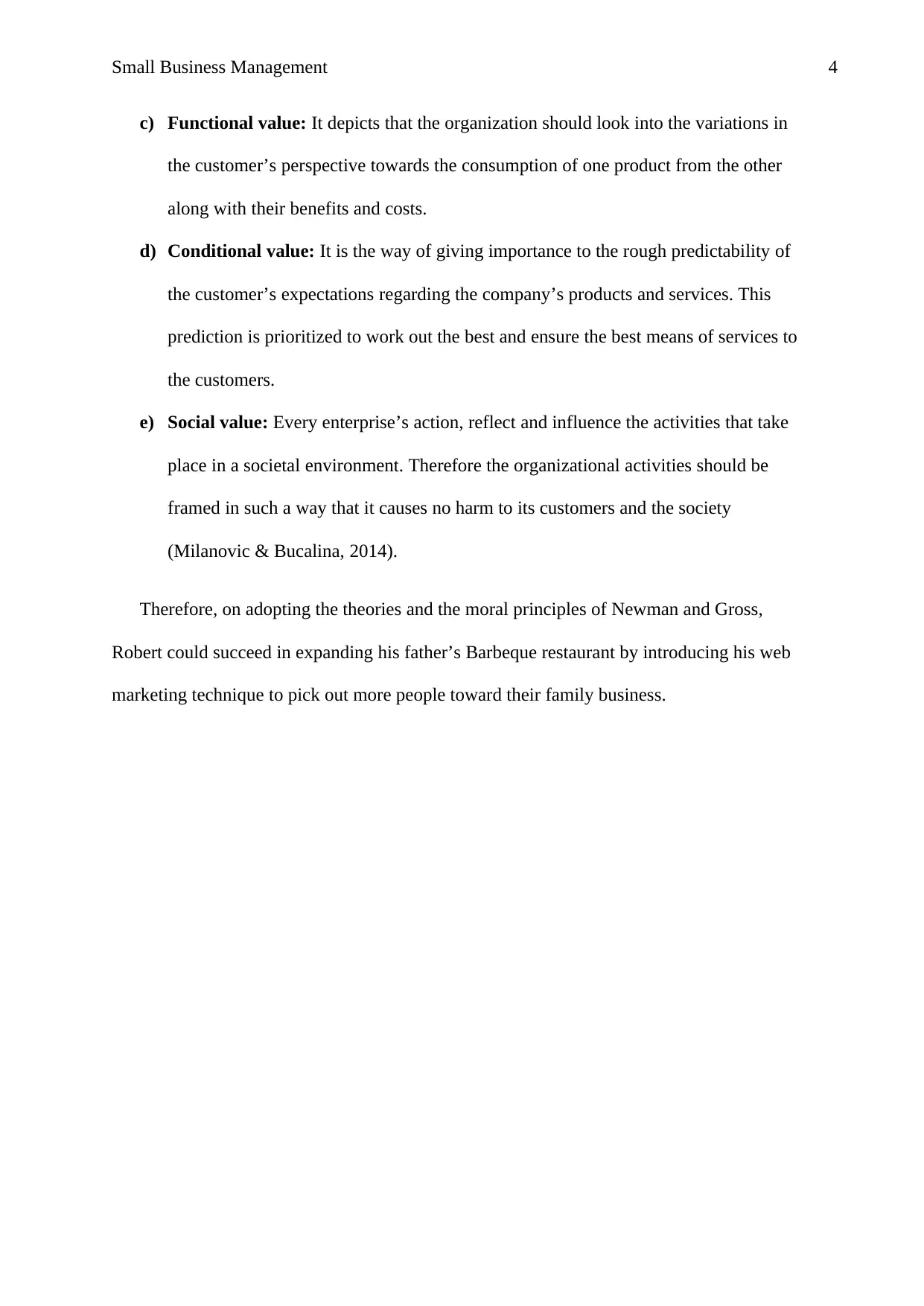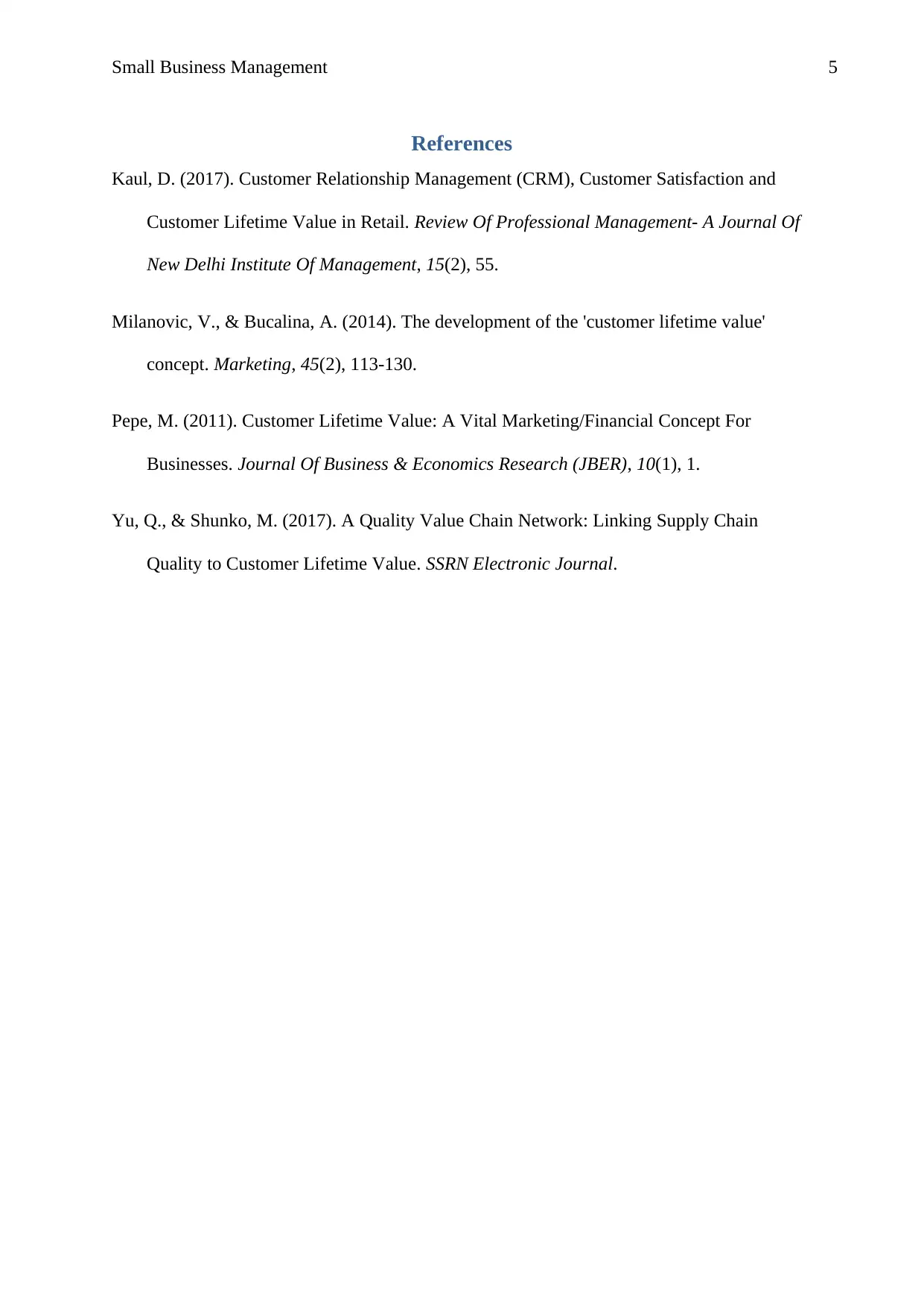Analyzing Robert's Expansion Plan for All-American Barbeque Restaurant
VerifiedAdded on 2023/04/21
|5
|682
|188
Case Study
AI Summary
This case study examines Robert Rainsford's plan to expand his father's restaurant, All-American Barbeque, by leveraging web marketing. The analysis emphasizes the importance of understanding and incorporating customer values, drawing on principles from Newman and Gross, including emotional, epistemic, functional, conditional, and social values. The study suggests that by prioritizing customer expectations and societal impact, Robert can successfully integrate web marketing to attract more customers and grow the family business. Desklib offers a wealth of similar case studies and academic resources for students.

Small Business Management 1
Title: Small Business Management
Assignment Name:
Student Name:
Course Name and Number:
Professor:
Date:
Title: Small Business Management
Assignment Name:
Student Name:
Course Name and Number:
Professor:
Date:
Paraphrase This Document
Need a fresh take? Get an instant paraphrase of this document with our AI Paraphraser

Small Business Management 2
Contents
Small Business Management.....................................................................................................3
Consideration of Customer Values............................................................................................3
References..................................................................................................................................5
Contents
Small Business Management.....................................................................................................3
Consideration of Customer Values............................................................................................3
References..................................................................................................................................5

Small Business Management 3
Small Business Management
In the case study, Robert has decided to expand his father’s business which was a
reputed restaurant named “All-American Barbeque”. He was quite successful with his spicy
sauces and variety dishes by winning the hearts of many customers. More emphasis was laid
on customer’s values and their comfort ability. Since Robert went with an idea of introducing
his web marketing in his father’s enterprise, he should make a deep penetration into the
customer expectation levels and the satisfying quotient of their taste buds (Pepe, 2011).
Consideration of Customer Values
Newman Customer Values:
Before carrying out any set of actions to expand the Barbeque further, Robert has to
adopt the principles followed by Newman, who believe that the great mantra to retain the
organization’s strength is the way of pulling the customers towards the market by doing well
to them (Yu & Shunko, 2017). Newman has donated a part of his profitable income to the
charity homes and this way he maintained the cultural dignity and the customer values.
Gross’s five types of values:
In a similar way Robert could follow the Gross’s five types of values. They are:
a) Emotional value: It is a kind of value where the emotions and the expressions of the
customers are given the first priority in the market business.
b) Epistemic value: It is a sort of value which gives importance to the true beliefs of the
customers. Inclusion of this value in any business would help in reaching the peaks of
the customer’s expectations (Kaul, 2017).
Small Business Management
In the case study, Robert has decided to expand his father’s business which was a
reputed restaurant named “All-American Barbeque”. He was quite successful with his spicy
sauces and variety dishes by winning the hearts of many customers. More emphasis was laid
on customer’s values and their comfort ability. Since Robert went with an idea of introducing
his web marketing in his father’s enterprise, he should make a deep penetration into the
customer expectation levels and the satisfying quotient of their taste buds (Pepe, 2011).
Consideration of Customer Values
Newman Customer Values:
Before carrying out any set of actions to expand the Barbeque further, Robert has to
adopt the principles followed by Newman, who believe that the great mantra to retain the
organization’s strength is the way of pulling the customers towards the market by doing well
to them (Yu & Shunko, 2017). Newman has donated a part of his profitable income to the
charity homes and this way he maintained the cultural dignity and the customer values.
Gross’s five types of values:
In a similar way Robert could follow the Gross’s five types of values. They are:
a) Emotional value: It is a kind of value where the emotions and the expressions of the
customers are given the first priority in the market business.
b) Epistemic value: It is a sort of value which gives importance to the true beliefs of the
customers. Inclusion of this value in any business would help in reaching the peaks of
the customer’s expectations (Kaul, 2017).
⊘ This is a preview!⊘
Do you want full access?
Subscribe today to unlock all pages.

Trusted by 1+ million students worldwide

Small Business Management 4
c) Functional value: It depicts that the organization should look into the variations in
the customer’s perspective towards the consumption of one product from the other
along with their benefits and costs.
d) Conditional value: It is the way of giving importance to the rough predictability of
the customer’s expectations regarding the company’s products and services. This
prediction is prioritized to work out the best and ensure the best means of services to
the customers.
e) Social value: Every enterprise’s action, reflect and influence the activities that take
place in a societal environment. Therefore the organizational activities should be
framed in such a way that it causes no harm to its customers and the society
(Milanovic & Bucalina, 2014).
Therefore, on adopting the theories and the moral principles of Newman and Gross,
Robert could succeed in expanding his father’s Barbeque restaurant by introducing his web
marketing technique to pick out more people toward their family business.
c) Functional value: It depicts that the organization should look into the variations in
the customer’s perspective towards the consumption of one product from the other
along with their benefits and costs.
d) Conditional value: It is the way of giving importance to the rough predictability of
the customer’s expectations regarding the company’s products and services. This
prediction is prioritized to work out the best and ensure the best means of services to
the customers.
e) Social value: Every enterprise’s action, reflect and influence the activities that take
place in a societal environment. Therefore the organizational activities should be
framed in such a way that it causes no harm to its customers and the society
(Milanovic & Bucalina, 2014).
Therefore, on adopting the theories and the moral principles of Newman and Gross,
Robert could succeed in expanding his father’s Barbeque restaurant by introducing his web
marketing technique to pick out more people toward their family business.
Paraphrase This Document
Need a fresh take? Get an instant paraphrase of this document with our AI Paraphraser

Small Business Management 5
References
Kaul, D. (2017). Customer Relationship Management (CRM), Customer Satisfaction and
Customer Lifetime Value in Retail. Review Of Professional Management- A Journal Of
New Delhi Institute Of Management, 15(2), 55.
Milanovic, V., & Bucalina, A. (2014). The development of the 'customer lifetime value'
concept. Marketing, 45(2), 113-130.
Pepe, M. (2011). Customer Lifetime Value: A Vital Marketing/Financial Concept For
Businesses. Journal Of Business & Economics Research (JBER), 10(1), 1.
Yu, Q., & Shunko, M. (2017). A Quality Value Chain Network: Linking Supply Chain
Quality to Customer Lifetime Value. SSRN Electronic Journal.
References
Kaul, D. (2017). Customer Relationship Management (CRM), Customer Satisfaction and
Customer Lifetime Value in Retail. Review Of Professional Management- A Journal Of
New Delhi Institute Of Management, 15(2), 55.
Milanovic, V., & Bucalina, A. (2014). The development of the 'customer lifetime value'
concept. Marketing, 45(2), 113-130.
Pepe, M. (2011). Customer Lifetime Value: A Vital Marketing/Financial Concept For
Businesses. Journal Of Business & Economics Research (JBER), 10(1), 1.
Yu, Q., & Shunko, M. (2017). A Quality Value Chain Network: Linking Supply Chain
Quality to Customer Lifetime Value. SSRN Electronic Journal.
1 out of 5
Related Documents
Your All-in-One AI-Powered Toolkit for Academic Success.
+13062052269
info@desklib.com
Available 24*7 on WhatsApp / Email
![[object Object]](/_next/static/media/star-bottom.7253800d.svg)
Unlock your academic potential
Copyright © 2020–2026 A2Z Services. All Rights Reserved. Developed and managed by ZUCOL.




